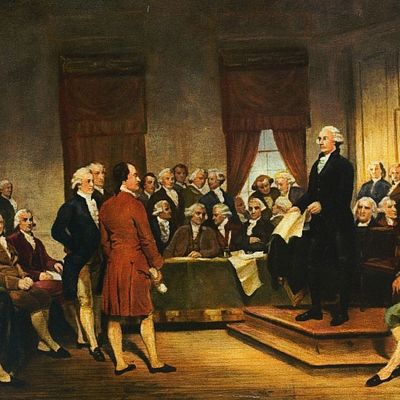
Any time you question the perfection of the American political system, you are bound to have a certain esteemed group of eighteenth-century gentlemen summoned to testify against you. And so it was that my harsh assessment of the U.S. Senate provoked this inevitable reply from National Review editor Rich Lowry:
So, first, I don’t accept the basic logic of “if the Founders created something it must be good.” If you ask me, the basic idea of a constitutional republic was great. The specific construction of that government was pretty shaky (for instance, it failed to account for the rise of political parties), and certain elements of that design were terrible (i.e., slavery). I’d assume that Lowry agrees with me on at least the last part. Like most liberals, I see the American system of government as requiring and allowing constant improvement of its own flaws.
In any case, the general question of the Perfect Wisdom of the Founders, while an important and continuing source of liberal-conservative disagreement, isn’t really the issue here. For the sake of our argument, let’s assume the founders were perfectly wise about absolutely everything, slavery and all. One of my complaints centered on the disproportionate representation of the Senate, which gives residents of small states far more power than residents of large states. (In this complaint, and in several of my citations below, I rely on the exhaustive work of Rick Hertzberg.)
The disproportionate representation of small-state citizens is often held to reflect a decision of the founders. In fact, it reflected nothing more than their capitulation to representatives of smaller states, who otherwise withheld their support for the Constitution.
Alexander Hamilton considered the Senate an affront to democracy:
As states are a collection of individual men,” he harangued his fellow-delegates, “which ought we to respect most, the rights of the people composing them, or of the artificial beings resulting from the composition? Nothing could be more preposterous or absurd than to sacrifice the former to the latter. It has been said that if the smaller states renounce their equality, they renounce at the same time their liberty. The truth is it is a contest for power, not for liberty. Will the men composing the small states be less free than those composing the larger?
James Madison and George Washington hated it, too. Just as the three-fifths compromise was needed to cut a deal with slave states, the Connecticut Compromise was needed to cut a deal with small states. It does not represent the wisdom of the founders any more than the three-fifths compromise does. It was a grudging concession to political reality — a “lesser evil” vis-à-vis failing to ratify the Constitution, in James Madison’s words.
Now, it is true that this compromise represented a bargain among the founders, if you consider “the founders” to include not only the men we think of as the founders (Washington, Madison, Hamilton, etc.) but also the politicians they had to deal with. So, from this perspective, it’s true that the founders established a system giving citizens of small states more political power than citizens of large states. At the time of ratification, the citizens of the smallest state enjoyed twelve times more representation than citizens of the largest state. Today the population ratio between the largest state (now California) and the smallest (Wyoming) has swollen to the point where residents of the latter enjoy 68 times as much representation in the Senate than residents of the latter. Doesn’t that violate the will of the founders? If they envisioned a chamber with a twelve-to-one ratio, wouldn’t the development of a chamber with more than five times the imbalance possibly run afoul of their vision?
The second complaint I made pertained to the filibuster. The filibuster is sometimes, though less frequently, attributed also to the genius of the founders. In fact, it is a pure historical accident that did not exist at the outset and changed dramatically over time. The Constitution sets out a few specific cases that require supermajority votes, strongly implying that its designers did not intend a regular supermajority requirement. The current 60-vote threshold dates back to 1975. If Lowry wants to cite an authority for the perfection of this rule, he must lean on the infallibility not of the founders but of Robert Byrd.






























